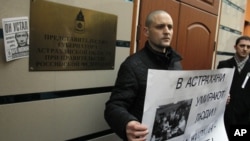Russia’s political opposition is changing tactics, one month after Russian Prime Minister Vladimir Putin won a six-year term as president. The opposition is taking the national fight local.
Alexey Navalny is the charismatic leader of Russia’s opposition. Last winter, he led mass rallies through Moscow’s snow and ice. But this week, he is in short sleeves, shouting into a bullhorn at a rally in Astrakhan, 2,000 kilometers southeast of Moscow.
Navalny flew to this Caspian Sea port to denounce what he calls fraud in last month’s election for city mayor.
Opposition candidate Oleg Shein has been on a hunger strike for 28 days. Shein charges the ruling-party candidate won after forcing election observers out of Astrakhan polling stations during vote counts.
Although pale and gaunt after losing 10 kilos, Shein speaks forcefully at a rally Tuesday.
Shein denounces the “criminal structures” in Astrakhan, a city of half a million people.
The arrival of Navalny and other leaders from Moscow is part of a new opposition strategy to take the fight for clean government to Russia’s regions. Next month, Vladimir Putin is to be inaugurated for a presidential term that is to stretch to 2018.
By taking their fight local, opposition forces have won three big city mayoral races in the past five weeks.
Pavel Felgenhauer is a Moscow political analyst.
"Despite Putin's landslide victory in presidential elections last March 4, the opposition movement in Russia is not dead and will continue," said Felgenhauer.
By focusing the Moscow media spotlight on Astrakhan, Russia’s opposition has made a local hunger strike a national political issue.
On Wednesday in Russia’s parliament, Prime Minister Putin responded to a question about Shein, saying, “It is a bit weird to go on hunger strike before a court makes its ruling.”
At that, members of the Fair Russia Party stood up, turned their backs on Mr. Putin,and walked out of the Duma.
Felgenhauer said the move was significant.
"Walkouts have taken before, but not in his face," he said. "This is a direct challenge. It shows that the opposition has a foothold not only in the streets of Moscow and other cities, but also in the places of power."
Shein, a former Duma deputy, went on a hunger strike last month to force Moscow to release local videos from web cameras that Mr. Putin had ordered installed in all of Russia’s voting stations. Shein charged the cameras would show violations in 60 percent of the city’s stations.
As national pressure mounts, Russia’s Central Election Commission Chairman Vladimir Churov assured reporters he is meeting demands to deliver all web-camera videos.
Churov also said the 30-percent vote gap between Shein and ruling-party candidate Mikhail Stolyarov was too large to justify canceling the city election.
As television crews flock to Astrakhan, Regional Prosecutor Oleg Dupak found himself on national television. He assured the regional legislature - and people watching across Russia - that election fraud was not large enough in Astrakhan to affect the outcome.
With the national media camped out in Astrakhan, the story shows no signs of going away. On Friday, the opposition is to launch a judicial appeal for an inquiry into election fraud. On Saturday, there are to be demonstrations in Astrakhan and in Moscow.
News
Russia’s Opposition Takes National Fight Local
- By James Brooke






